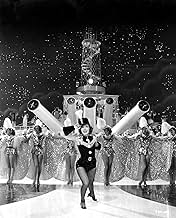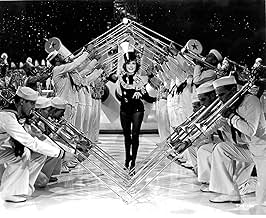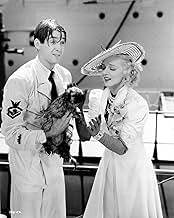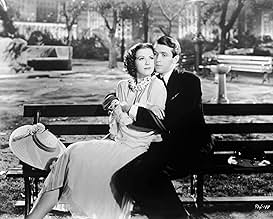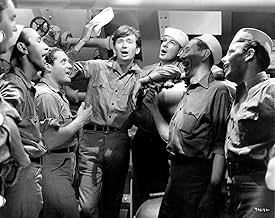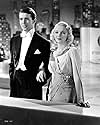Aggiungi una trama nella tua linguaOn leave, a sailor falls in love with a young lady aspiring to become a Broadway dancer, but their relationship is jeopardized by an established Broadway star, who is also enamored by him.On leave, a sailor falls in love with a young lady aspiring to become a Broadway dancer, but their relationship is jeopardized by an established Broadway star, who is also enamored by him.On leave, a sailor falls in love with a young lady aspiring to become a Broadway dancer, but their relationship is jeopardized by an established Broadway star, who is also enamored by him.
- Regia
- Sceneggiatura
- Star
- Candidato a 2 Oscar
- 1 vittoria e 2 candidature totali
- Georges and Jalna
- (as Georges and Jalna)
- Georges and Jalna
- (as Georges and Jalna)
- Member of The Foursome
- (as Ray Johnson)
Recensioni in evidenza
Jimmy Stewart in a musical. Where's Clarence when he really needs him?!? Seriously though, Jimmy does a good job. He's not the best singer but he can carry a tune. If you like pretty movie stars, this one's the picture for you -- Eleanor Powell, Virginia Bruce, Una Merkel, Frances Langford are all beauties. Powell is the star of the show with her awesome tap dancing numbers. Keep your eyes peeled for Dennis O'Keefe in Powell's first number. He's the guy she taps on the shoulder. Una Merkel is perfection as always. Buddy Ebsen singing and dancing is a hoot. Sid Silvers and Raymond Walburn are funny comic relief. Adorable Juanita Quigley plays Una & Sid's daughter.
It's a slight but fun story with a killer cast. Outstanding Cole Porter songs include classics "Easy to Love" and "I've Got You Under My Skin." But my personal favorites are " Hey, Babe, Hey" and "Swingin' the Jinx Away." As always, Eleanor Powell's dancing is spectacular. Add some nice humor and the immense likability of Powell and Stewart and you have a real gem. Get this on DVD or catch it on TCM next time they show it.
As musicals go, this is in the revue tradition, with the lightest of plots tying together a collection of song and dance numbers, comic bits and of course, a big, show-stopping finale. The plot here, mixing sailors and Broadway shows only occasionally flirts with reality. The score, written for the film, is entirely by Cole Porter and includes two of his best-known standards, "Easy To Love", and "I've Got You Under My Skin". Though fun, most of the other numbers are in service of the film and were not written to become popular without it. Composers rarely threw a whole group of top songs into a musical, though Porter himself did late in his career with "Kiss Me Kate".
The songs do all serve their purpose. The opening number, "Rolling Along", introduces all the sailors with a male chorus singing something similar to a college fight song (Porter had famously written Yale's). Powell is introduced quickly after this with an orchestra playing "Easy to Love" as she walks down the street, establishing it as the film's love theme. It will be repeated in a big number in Central Park sung by Stewart and Powell. Powell is dubbed by Marjorie Lane, but Stewart is not. His voice is a bit like Fred Astaire's: a light tenor with an almost wispy feeling at times, singing in a way that is somewhere between talking and really belting out a song.
"Rap, Tap on Wood" is a show-biz style number that gives Eleanor a chance to dance in a lobby where four sailors pop up and not only sing, but also play a flute and three ocarinas. "Hey Babe Hey" with a carousel-like melody, gives all three couples a chance to sing in the same number. This film has not just the usual second couple (Merkel and Silvers), which traditionally is comedic but even a third couple. People here fall in love immediately and for no apparent reason, hence Frances Langford and Buddy Ebsen are a couple. Ebsen was an accomplished tap dancer, but here does some swaying moves like he's made of rubber, creating an odd visual effect..
"I've Got You Under My Skin" goes to Virginia Bruce, who plays a Broadway diva whose penthouse is done up in an all-white mix of Deco and Rococo with a gigantic mirror and a terrace with its own fountain. It's on the terrace that she sings it to Stewart, hoping to win him away from Powell. It's a great setting for a great song. The gigantic finale takes place on a stage version of a battleship with everyone done up in white tails and sequins and the music of "Swingin' the Jinx Away" a razzmatazz, Irving Berlin-style number with jivey sections that mention Cab Calloway as their inspiration. This gives everyone a chance to do their specialty and ends things fittingly with only the shortest of scenes afterward to tie up the ends of the plot.
Within all this director Roy Del Ruth places three extended bits by character actors, all of which are memorable. Barnett Parker was a stuffy butler with few lines in many films, but here he does a funny turn as a model home salesman-interior designer in a pompous British manner. Another Brit, Reginald Gardiner, comes on as a cop in what would usually be a ten second walk-on to interrupt the main characters (think "Singing In the Rain") but instead ends up doing a hilarious impersonation of Leopold Stokowski ("Fantasia") conducting. This bit, his first in films, made him a regular character actor in Hollywood. He's now probably best known for "Christmas In Connecticut". Ruth Troy, popular radio comedian, does a shorter but funny bit as a secretary on the phone with a friend.
Overall the film is pleasant if awfully light. The lightness actually helps as there's no need to develop any plot complexities and doesn't overdo it with too many gargantuan numbers. Some of the lines of banter in the script are genuinely funny. Mostly it's Eleanor Powell just bursting into stardom as one of the screen's best dancers ever. She also has a winning way with her character. She's warm and friendly and much like a girl next door, but also can project sophistication and social grace. Una Merkel is her usual loveable, down to earth character as the lead's friend. Stewart was himself just breaking out and had even been given some villainous roles up to this point, but here amid all the foolishness seems genuinely in love with Powell. A good, if not great musical with two great Cole Porter classics.
There's not much of a story, and not much of one is needed. Newcomer to the big city Nora Paige (Powell) meets sailor Ted (Stewart). They fall in love; meanwhile, she gets into a show understudying the lead, the great Lucy James (Bruce).
Ted saves Lucy's Pekinese when it jumps into the water, and the producers use that for publicity, cooking up a romance between Ted and Lucy. Nora is heartbroken, believing that Ted is cheating on her. They fight. Lucy ends up walking out of the show; Powell then becomes the star - you can guess the rest.
Certainly this is a wonderful score, one of the best, with the wonderful "Easy to Love," "I've Got You Under My Skin," "Rolling Home," "Rap-Tap on Wood," and others. The surprise of the cast is James Stewart, singing in a Fred Astaire sort of way - he's delightful, very musical, with a sweet voice that goes well with his boyish demeanor.
Eleanor Powell is one of the great film tap dancers, and she gets to do a lot of numbers. She's a very pretty woman with a wide smile. I find her non-tap work a little odd, as her choreography always seems to include a front kick which looks awkward. It's the kind of move that non-dancers like Raquel Welch do in nightclub acts and it doesn't really suit Powell. She is a very likable presence and it's really fireworks when she gets a-tappin'!
Una Merkel, Sid Silvers, et al. Provide excellent support and good comedy, which is abundant in the script that makes the most of dialogue even if the story is thin. Virginia Bruce is great as the glamorous Broadway star. She performs "I've Got You Under My Skin," beautifully.
Stewart sings "Easy to Love," and I can still remember the look on Carol Burnett's face when he sang it to her many years ago, I believe on her TV show. She spoke of going to the movies with her grandmother and watching him on the screen. To have him sing that song to her was an overwhelming moment. It's one of the nicest scenes in the film, too, to see this tremendous star when he was so young and fresh.
This is simply a wonderful walk - or should I say tap - down memory lane. Don't miss it.
The second of its annual Eleanor Powell musicals, BORN TO DANCE brings back her co- stars from her initial MGM musical, Broadway MELODY OF 1936, including Sid Silvers, Una Merkel, Frances Langford and Buddy Ebsen, with Virginia Bruce substituting for June Knight as the temperamental actress. As an added plus Frances Langford, who, in Broadway MELODY of 1936, only participated in the song numbers, this time gets to belt out her songs and take part of the plot.
Following the opening titles with a background of musical notes (yes, this is a musical) and still silhouette dancing images of Eleanor Powell, the story opens with singing sailors submerging from a submarine and going on shore leave in New York City. Ted Parker (James Stewart) meets Nora Paige (Eleanor Powell) at a Lonely Hearts Club, managed by Jenny Saks (Una Merkel), who is married to a Ted's fellow Navy partner, "Gunny" (Sid Silvers), whom she hasn't seen in four years, and through him, is the mother of a three-year-old daughter (Juanita Quigley). While Jenny finds Gunny to be a big disappointment to her, and unwilling to tell him that he is a father, Ted finds himself becoming very much interested in Nora, whose ambition is to become a dancer (hense the title). Their romance is soon broken up when Lucy James (Virginia Bruce), a famous musical-comedy star, along with her press agent, James McKay (Alan Dinehart), visits Ted's ship for publicity pictures, and after her Pekinese dog falls over board with Ted jumping in to save it, McKay then makes a romance story out of it. Ted finds his time being occupied being with Lucy, and away from Nora. However, Ted arranges for Nora to get into Lucy's upcoming show as her understudy without either girl being aware as to whom was responsible for this arrangement. As Ted is going through his complications such as believing Nora to be a mother to Jenny's little girl, there is "Mush" Tracy (Buddy Ebsen) who finds time in becoming the romantic interest of another Lonely Hearts Club employee, "Peppy" Turner (Frances Langford).
Song numbers include: "Rolling Home" (sung by the Foursome Quartet, Sid Silvers, Buddy Ebsen and James Stewart); "Rap-Tap on Wood" (sung and danced by Eleanor Powell); "Hey Babe, Hey Babe" (sung by James Stewart, Eleanor Powell, Sid Silvers, Una Merkel, Buddy Ebsen and Frances Langford); "Here Comes Lucy James" (sung by sailors); "The Captain Had a Very Bad Night Last Night" (recited by Raymond Walburn); "Love Me, Love My Pekinese" (sung by Virginia Bruce/ chorus); "Easy to Love" (sung by James Stewart & Eleanor Powell); "I've Got You Under My Skin" (danced by George & Jalna/ sung by Virginia Bruce); "Easy to Love" (sung by Frances Langford/ danced by Buddy Ebsen); "Love Me, Love My Pekinese" (audition dance by Eleanor Powell); "Swinging the Jinx Away" (sung by Frances Langford/ with Buddy Ebsen/ danced by Eleanor Powell); and "Easy to Love" (sung by cast).
The other members of the cast consists of Raymond Walburn, Barnett Parker, Jonathan Hale and Reginald Gardiner, making his movie debut, in an awkward but amusing cameo as a policeman in Central Park who fantasizes himself as conducting to the score to "Easy to Love" with an unseen orchestra (only in New York!).
As with Powell's other "Broadway Melody" series, BORN TO DANCE includes moments of singing and dancing on cue, with a full orchestra playing in the background, whether it be at the Lonely Hearts Club, on the Navy vessel or in the middle of Central Park. Comedy also takes its toll in BORN TO DANCE, including Walburn as the confusing captain who can't distinguish the difference between the very tall Mush (Ebsen) and the ultra short Gunny (Silvers), asking them if they are twins, and in giving an assignment for Mush deliver an important message to a Rear Admiral Stubbins at the Brooklyn Navy Yard. Mush, however, keeps forgetting, and when he does remember, can't find Brooklyn and ends up in Yonkers; as well as Helen Troy's classic bit as sharp-tongue Brooklyn-ese switchboard operator. Troy must have been an inspiration for Lily Tomlin's comedic character in later years when appearing as a telephone operator in the late 1960s variety comedy show of LAUGH-IN.
BORN TO DANCE is light on plot, memorable on songs and well constructed with dance numbers as choreographed by Dave Gould, highlighted by the lavish but classic 13 minute finale of "Swingin' the Jinx Away" (portions would be reused again for the finale in Eleanor Powell's latter 1943 musical titled I DOOD IT, newly re-scored to appeal more to the big band era for the time of its release).
Other than having its presentations on commercial television some decades ago, the original soundtrack recording to BORN TO DANCE was displayed in record stores in the late 1970s. If there is any Eleanor Powell worth seeing, it's BORN TO DANCE, by all means, that's what she was, and does it well. Available viewing on Turner Classic Movies. (***1/2)
Lo sapevi?
- QuizCole Porter picked James Stewart for the male lead and later said he sang "Easy to Love" as well as any professional singer. A dubbing track was prepared with baritone Jack Owens, but it was decided that Stewart's tenor voice was perfect for the song. In C'era una volta Hollywood (1974), Stewart said, "The song had become a huge hit, even my singing wouldn't hurt it."
- BlooperThe opening scene is set aboard a submarine entering New York Harbor while submerged at periscope depth. Her skipper would have brought her in while surfaced - the risk of collision in a busy port is substantial.
- Citazioni
McKay's Telephone Operator: [on phone with her friend] Oh say guess who I seen at Club Continental last night? Lucy James with that sailor she met through a Pekingese. Believe me he's a sea-goin' thrill if I ever seen one. What's he like? Well, tall - sort of the answer to a maiden's prayer on stilts. Honest he must be six feet four and that's just two inches shorter than a totem pole. Oh but he's got a smile like concentrated vodka. Vodka! Oh it's a Japanese drink made out of panther blood I think.
- Curiosità sui creditiOpening credits are shown over a female figure tap-dancing on stage.
- ConnessioniEdited into Grand Central Murder (1942)
- Colonne sonoreRolling Home
(1936) (uncredited)
Music and Lyrics by Cole Porter
Sung by The Foursome, Sid Silvers, Buddy Ebsen, James Stewart and chorus
I più visti
- How long is Born to Dance?Powered by Alexa
Dettagli
Botteghino
- Lordo in tutto il mondo
- 941.774 USD
- Tempo di esecuzione1 ora 46 minuti
- Colore
- Proporzioni
- 1.37 : 1
Contribuisci a questa pagina



